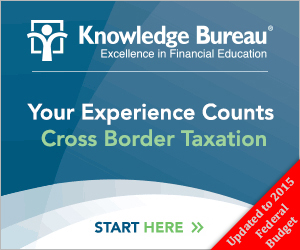Last updated: November 03 2015
Snowbirds Need to be Aware of Taxation Issues

It’s November and that means Snowbirds are on the move again to Florida, Arizona, California and Texas to name a few of the favorite spots. People who ordinarily reside in Canada but spend part of the year in the United States must take caution to ensure they are not spending too much time in the U.S., which would deem them a U.S. resident for tax purposes and potentially a non-resident of Canada.
Canada and the U.S. both have “substantial presence” tests that can deem a normally non-resident individual to be a resident of that country for tax purposes. This becomes a very important issue when you consider the tax implications it can have on an individual and their family. Canadian taxation and benefits are based on residency and U.S. taxation and benefits are based on residency as well as citizenship.
An individual will be considered a U.S. resident for tax purposes if they meet the substantial presence test for the calendar year. To meet this test, they must be physically present in the United States for 183 days in the current year or 183 days over a three-year period. If the test is met over a three-year period, an 8840 Closer Connection form will need to be filed with the IRS; however, if the test is met in the current year alone, the taxpayer will need to file a 1040NR non-resident income tax return, along with a Form 8833 treaty election claiming closer ties to Canada under the rules of the Income Tax treaty. Meeting the test in the current year could mean the taxpayer may have U.S. immigration issues as well. Immigration rules and tax rules are very different: Immigration time tests run on a rolling 12-month period; whereas tax tests are on a calendar year basis.
The new border tracking systems that are currently in place allow both Canada and the U.S. to track the amount of time a person spends inside and outside each country. As mentioned in a recent article by CBC, Canada and the U.S. will be using this information to determine an individual’s residency and, in turn, eligibility for various tax benefits and credits only available to residents of the particular country. Because of this, it is now more important to accurately track your time away from your country of residence and be aware of potential foreign filing requirements that may exist in the non-resident country so you don’t fall into unexpected trouble.
 |
More information on all these rules and many more is available in my book, titled Canadians and the IRS: What You Need to Know About Uncle Sam, and in the Knowledge Bureau professional certificate course I authored on Cross Border Taxation.
Angela Preteau is a CA as well as a CPA, licensed in North Dakota. She recently made partner at Frostiak & Leslie Chartered Accountants and is the resident US tax professional in her office, one of the only tax professionals in Manitoba who deals with US as well as Canadian income tax issues, with a high concentration on cross-border taxation. She is one of the 18 featured speakers at the 12th Distinguished Advisors Conference, Nov. 8-11 in Puerto Vallarta, Mexico.
